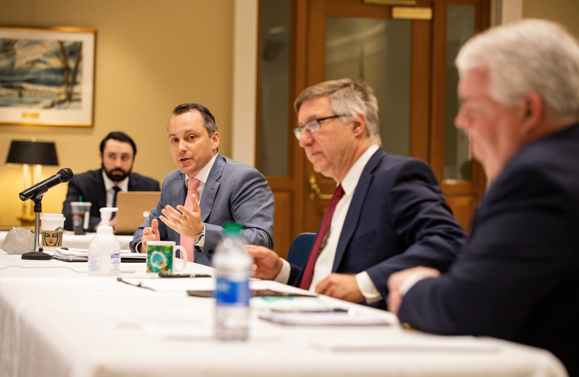April 14, 2020

Rep. Aaron Michlewitz, shown above in a file photo, second from left. State House News Service photo

COMMENTARY/COVID-19: House Ways and Means chairman weighs issues
The Massachusetts economy went into free fall a month ago. As a result, tax revenues for the final quarter of FY20 (April-June) will likely be $500-$750 million below budget. In addition, the Commonwealth is spending millions of dollars stabilizing hospitals and other health care organizations, supporting public transit and other state and regional entities, and will probably need to invest to keep the unemployment trust fund solvent.
Still, between the $2 trillion federal aid program and our state’s rainy day fund, we should be able to balance our books for the end of the fiscal year, June 30.
But what about FY21, which starts on July 1?
Although there is talk of another federal aid or “stimulus” program, it is not a certainty that Congress will pass another package. As a result, our Legislature and the governor have launched an effort to study the economic impact of COVID-19 and to play out scenarios on what FY21 could look like, depending on how long the Commonwealth needs to be shut down.
To start the process, a virtual “Economic Roundtable” hosted by the House and Senate Ways and Means chairs and the Executive office of Administration and Finance was held on April 14. One forecast at this event predicted that state tax collections in 2020 will plunge 20 percent and unemployment will soar to 14.7 percent, with the state’s gross domestic product this year declining by 7.2 percent.
One of the leaders of the roundtable is the House chair of Ways and Means, Rep. Aaron Michlewitz, who represents downtown Boston from the North End to the South End. He was elected in 2009, and is in his first term as chairman of the panel. He said that the roundtable will be an effort to get some answers as Massachusetts economists and budget experts “delve deeper into those numbers.”
One of the problems they need to deal with is the impact of delaying the deadline for filing state income tax returns until July 15, two weeks after the end of the fiscal year. He said it was a “$3.5 billion revenue piece,” and that the state is considering borrowing in anticipation of this income. He also expressed his concern about the unemployment trust fund with half a million unemployed in Massachusetts.
Michlewitz anticipates that the state may pass “a temporary budget,” and that they “have to be creative in their approach.
“We don’t want to use up the rainy day fund before we even have an idea of where we’re headed,” he said, adding that “keeping flexibility alive is important. [The federal government] will play a major role on what we’re able to take on, including local aid. Cities and municipalities had to take on providing wrap around services traditionally provided by schools. The state has a role to play in being helpful.”
He further noted that the Legislature is questioning whether deductibility of charitable donations should be implemented on July 1, as that would reduce tax revenue by $300 million.
Legislators are also considering an “accelerated sales tax,” which means that the state would collect sales tax revenue in the month it is generated rather than, as is currently the case, one month behind. Essentially, this means that there could be 13 months’ worth of sales tax revenue during the 12-month FY21, though Michlewitz expressed concern about that action’s impact on small businesses.
Regarding the new “Student Opportunity Act,” he said that the Legislature was in the process of “putting together a strong first year,” but it “has to be reanalyzed and reconfigured because of the circumstances we’re in.” He hopes to have some implementation in FY21, and in the years following, he said, there may be “some things that come down the pike (to help with funding) like the millionaires’ tax.”
On public transit: “We passed in the House a major transportation revenue package. I don’t know what the Senate will do at this point … raising taxes in a pandemic is certainly very difficult to do. The idea of implementing a better transportation structure, including the MBTA, is still a hope.”
Asked what has been learned about having to deal with the pandemic, Michlewitz said, “We didn’t have resources immediately to be able to combat this issue – PPEs and ventilators – so we had to rely on outside resources for us to survive the turmoil and chaos, which has been a wake-up call for many of us in state and local government. We used to feel more comfortable relying on the federal government, but that’s certainly not the case the way Washington is operating now.
“We had to chase after masks and PPE; it has been an eye opener.
“These are unprecedented times,” said Michlewitz. “The state government slowed the economy down to stop a public health crisis and it is unknown how or when to wake up the economy. And we don’t know how long it’s going to take.”
While he said he has concerns about social problems that could become exacerbated from a lengthy shutdown, he expressed confidence from seeing how well all the parts of our Massachusetts government have been working together in these difficult times.


